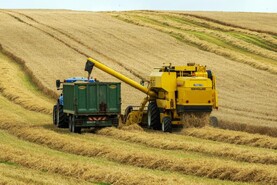Grain markets were not looking too positive this week. All French wheat prices moved down last week.
The Matif wheat price for December 2024 hit €229.75/t on Friday 12 January. That was down €5.50/t on the week before. It fell further this week, hitting €227.25/t on Tuesday evening.
London wheat also moved down this week, with the November 2024 price dropping to £202.35/t on Friday and £200.85/t on Tuesday. There are some reports of tightening global wheat supplies, but maize is in ample supply.
Maize
Maize price has been dropping as well and as we’ve seen before, maize prices cheaper than barley do not bode well for the Irish product.
At the start of January, maize imports were priced at €235/t. That is now reported to be around €225/t, so is coming near the spot barley price. This is something to watch out for.
European and Chicago maize prices have been on a downward trend recently.
As we’ve been mentioning a lot lately, the South American maize crop will be big. The next few months will tell us how big that crop will be. Brazil’s second maize crop is currently being planted.
In the US, the Department of Agriculture’s annual production figures released on Friday stated that the 2023 grain maize crop was a record high at 15.3 billion bushels. This was up 12% from the 2022 estimate.
A record yield of 177.3bu/acre, 3.9bu above the 2022 estimate, contributed to this.
The same report showed that in the US in 2023, almost 320 million acres were planted with principal crops and approximately 296 million acres of that were harvested.
This month’s World Agricultural Supply and Demand Estimates (WASDE) report forecast global coarse grain production, which includes maize and barley, for 2023/24 to be up by 11.9m tonnes to 1,513.9m.
The report stated: “This month’s foreign coarse grain outlook is for larger production, lower trade and higher stocks.”
Beans
Dairygold has set a minimum price for beans for the 2024 harvest. Growers who lock into the offer will be paid at least €250/t for beans delivered at 20% moisture content at harvest time.
If the beans price goes up, farmers will be paid above this price, but if it goes down they will receive €250/t.
The price is a strong offer of support from the co-op when compared with the price for other protein sources and makes a clear statement that it wants Irish protein. Along with the protein payment it makes beans a good risk management tool.






 This is a subscriber-only article
This is a subscriber-only article










SHARING OPTIONS: